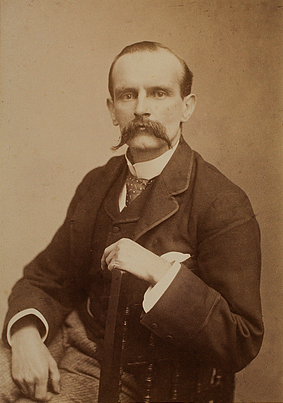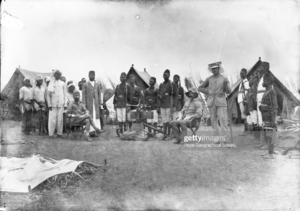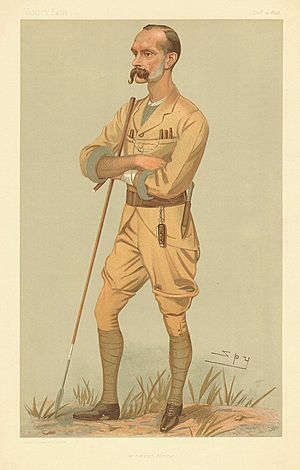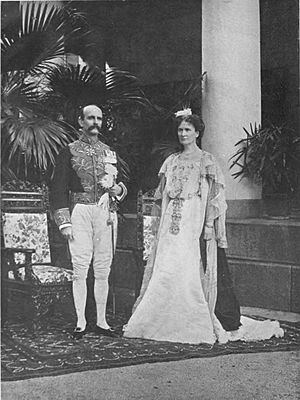Frederick Lugard, 1st Baron Lugard facts for kids
Quick facts for kids
The Lord Lugard
|
|||||||
|---|---|---|---|---|---|---|---|
 |
|||||||
| Governor-General of Nigeria | |||||||
| In office 1 January 1914 – 8 August 1919 |
|||||||
| Preceded by | Office created | ||||||
| Succeeded by | Sir Hugh Clifford (as Governor) | ||||||
| Governor of the Northern Nigeria Protectorate | |||||||
| In office September 1912 – 1 January 1914 |
|||||||
| Preceded by | Sir Charles Lindsay | ||||||
| Succeeded by | Office abolished | ||||||
| Governor of the Southern Nigeria Protectorate | |||||||
| In office September 1912 – 1 January 1914 |
|||||||
| Preceded by | Sir Walter Egerton | ||||||
| Succeeded by | Office abolished | ||||||
| 14th Governor of Hong Kong | |||||||
| In office 29 July 1907 – 16 March 1912 |
|||||||
| Monarch | Edward VII George V |
||||||
| Colonial Secretary | Sir Francis Henry May Warren Delabere Barnes Sir Claud Severn |
||||||
| Preceded by | Sir Matthew Nathan | ||||||
| Succeeded by | Sir Francis Henry May | ||||||
| High Commissioner of the Northern Nigeria Protectorate | |||||||
| In office 6 January 1900 – September 1906 |
|||||||
| Preceded by | Office created | ||||||
| Succeeded by | Sir William Wallace (acting) | ||||||
| Personal details | |||||||
| Born | 22 January 1858 Madras, British India |
||||||
| Died | 11 April 1945 (aged 87) Dorking, Surrey, England |
||||||
| Spouse |
Flora Louise Shaw
(m. 1902; died 1929) |
||||||
| Alma mater | Royal Military College, Sandhurst | ||||||
| Profession | Soldier, explorer, colonial administrator | ||||||
| Chinese name | |||||||
| Traditional Chinese | 盧吉 | ||||||
| Simplified Chinese | 卢吉 | ||||||
|
|||||||
Frederick John Dealtry Lugard, 1st Baron Lugard (born January 22, 1858 – died April 11, 1945), also known as Sir Frederick Lugard, was a British soldier, explorer, and colonial administrator. He held important positions in British colonies. He was the Governor of Hong Kong from 1907 to 1912. He also served as the last Governor of the Southern Nigeria Protectorate (1912–1914). In Northern Nigeria Protectorate, he was the first High Commissioner (1900–1906) and later its last Governor (1912–1914). Finally, he became the first Governor-General of Nigeria from 1914 to 1919.
Contents
Early Life and Education
Frederick Lugard was born in Madras, which is now called Chennai, in India. However, he grew up in Worcester, England. His father, Reverend Frederick Grueber Lugard, was a British Army chaplain.
Lugard attended Rossall School and the Royal Military College, Sandhurst. Sandhurst is a famous military academy in England. The name 'Dealtry' was given in honor of a friend of his father, Thomas Dealtry.
Military Adventures
Lugard joined the army in 1878. He served in several conflicts, including the Second Anglo-Afghan War (1878–1880) and the Sudan campaign (1884–1885). He also fought in the Third Anglo-Burmese War in 1885. For his bravery, he received the Distinguished Service Order in 1887.
His military career faced a challenge when he left his post in Burma to be with a woman he knew who had been injured. After this personal event, Lugard decided to seek new opportunities in Africa.
The Karonga War
In the 1880s, Swahili traders set up bases near Lake Malawi in Africa. They traded ivory and slaves. The African Lakes Company, a British trading company, also set up a base nearby.
Relations between the Swahili traders and the company became tense. The Swahili traders began attacking communities that the company had promised to protect. This led to a series of fights from 1887 to 1889, known as the Karonga War.
In 1888, Captain Lugard arrived to lead an expedition against the Swahili leader, Mlozi. This expedition was supported by the African Lakes Company. Lugard's first attack in May 1888 had limited success, and he was wounded. His second attempt in December 1888 also failed to break through the strong defenses. After these attempts, Lugard left the Lake Malawi area in April 1889.
Exploring East Africa
After his time in Nyasaland, Lugard joined the Imperial British East Africa Company (IBEAC) in December 1889. This company had permission from Queen Victoria to colonize British areas between Zanzibar and Uganda. They wanted to create a trading route between Lake Victoria in Uganda and the coastal city of Mombasa.
Lugard's first job was to find a new, safer route from Mombasa to Machakos, avoiding a difficult desert. He explored the Sabaki River area. He also worked on a plan to free slaves held by Arabs in Zanzibar.
On August 6, 1890, Lugard began a long journey to Uganda. His goal was to make sure Britain had more influence than Germany in the area. He also aimed to stop conflicts between different groups in the kingdom of Buganda.
Along the way, Lugard was told to make treaties with local tribes. He also built forts to protect future IBEAC expeditions. Lugard often used a special "blood brotherhood" ceremony to form alliances with local leaders. One famous alliance was with Waiyaki Wa Hinga in Kikuyu territory in October 1890.

Lugard served as the Military Administrator of Uganda from December 1890 to May 1892. During this time, he explored and mapped a large part of the country, including the Rwenzori Mountains and Lake Edward. He also visited Lake Albert and helped thousands of Sudanese people who had been left there by other explorers.
When Lugard returned to England in 1892, he convinced Prime Minister William Gladstone not to let the IBEAC give up its control of Uganda.
Early Colonial Work
In 1894, the Royal Niger Company sent Lugard to Borgu. There, he made agreements with local kings and chiefs. These agreements recognized British company rule and reduced the influence of other European powers.
From 1896 to 1897, Lugard led an expedition to Lake Ngami in what is now Botswana. The British government then called him back to West Africa. He was asked to create a local army to protect British interests in the area around Lagos Colony and Nigeria from French expansion. In August 1897, Lugard formed the West African Frontier Force. He led this force until late 1899, when the disagreements with France were resolved.
After leaving the West African Frontier Force, Lugard became the High Commissioner of the new Northern Nigeria Protectorate. On January 1, 1900, he officially announced the creation of this protectorate in Lokoja. At first, only a small part of Northern Nigeria was under British control. Lugard faced challenges because some local leaders did not want to follow their treaty agreements.
By 1903, British control expanded after a successful campaign against the emir of Kano and the sultan of Sokoto. When Lugard left his role in 1906, the entire region that would become modern-day Nigeria was being managed peacefully by British officials.
Lugard was knighted in 1901 for his work in Nigeria. He helped bring peace and order, and he stopped slave raiding and abolished slavery. He also started to develop the country by surveying land, mapping areas, and improving transport and communication. He also changed the taxation system. Lugard is best known for his system of "indirect rule" in Nigeria, especially in Igboland. This system allowed local leaders to continue governing under British supervision.
Governor of Hong Kong
About a year after leaving Northern Nigeria, Lugard was appointed Governor of Hong Kong. He served in this role until March 1912. During his time, Lugard suggested giving Weihaiwei back to China. In return, he wanted Britain to permanently control the New Territories in Hong Kong. This idea was not accepted, but some believe it might have kept Hong Kong under British rule forever.
Lugard was very interested in education. He is largely remembered for his efforts to establish the University of Hong Kong in 1911. He became the university's first chancellor. He believed the university should spread Western culture in East Asia. He also wanted the university to support the colonial government and not teach ideas like democracy. He received financial support from his friend Hormusjee Naorojee Mody, who shared his vision for the university.
Governor of Nigeria
In 1912, Lugard returned to Nigeria as Governor of the two protectorates (Northern and Southern Nigeria). His main goal was to combine them into one colony. This idea was debated in Lagos, but most people in other parts of the country did not fully understand its impact. Lugard did not pay much attention to public opinion.
From 1914 to 1919, Lugard served as the first Governor-General of the newly combined colony of Nigeria. He worked hard to improve the lives of the local people. He tried to stop the sale of alcohol and end slave raiding and slavery.
Lugard, with help from his wife Flora Shaw, created a view of himself and colonial rule that shaped understanding for many years. He believed that "the typical African... is a happy, thriftless, excitable person, lacking in self control, discipline and foresight... in brief, the virtues and defects of this race-type are those of attractive children."
Money for developing Nigeria's infrastructure, like harbors, railways, and hospitals in Southern Nigeria, came from taxes on imported alcohol. Northern Nigeria had less revenue for development because these taxes were not collected there. So, projects in the North were often funded by money from the South.
The Adubi War happened during his time as governor. In Northern Nigeria, Lugard allowed slavery to continue within traditional elite families. He did not like educated Africans living in the coastal areas. Lugard often spent half the year in England, which meant decisions in Africa were delayed until he returned. He preferred a military style of rule.
Lugard's biggest achievement for modern Nigeria was successfully combining the North and South in 1914. Even after this, the two parts kept separate administrations for a while. This combining helped Nigeria have common telegraphs, railways, customs, a Supreme Court, a standard time, a common currency, and a shared civil service. He introduced many things needed for a modern state.
He also started the first legislative assemblies in Nigeria by creating the Nigerian Council in 1914. This council included the Governor, Chief Secretary, and some appointed members. They met to hear government policies and offer advice. However, it only made laws for the South. It was a step towards the Legislative Council that came later.
Despite his contributions, Lugard's work had some issues. He wanted to create one administrative unit in Nigeria but did not aim to create a single Nigerian nation. His policy of keeping the North separate from the South, which his successors continued, contributed to disunity in Nigeria. For example, the North was not included in the Legislative Council until 1947. This is seen by some as sowing the seeds of separation that still affect Nigerian unity today.
Lugard was also partly responsible for the slower development of education and other social services in the North. This is why the South advanced more quickly in education than the North. Overall, Lugard's approach suggested he did not plan for Nigeria to become self-governing. He aimed for long-term British colonialism. His system of Indirect Rule, his dislike of educated Nigerians in the South, and his education system for the North (which focused on training chiefs' sons as clerks) show him as a strong supporter of the British Empire.
He once said about the future of British colonialism in Africa: "For two or three generations we can show the negro what we are, then we shall be asked to go away. Then we shall leave the land to those it belongs to with a feeling that they have better business friends in us than in other white men."
The Dual Mandate in British Tropical Africa
Lugard's book, The Dual Mandate in British Tropical Africa, was published in 1922. It discussed his ideas about indirect rule in colonial Africa. He believed that governing Africa could both help the local people and develop the continent's resources for everyone's benefit.
Lugard outlined three main principles for colonial administration:
- Decentralization: Giving power to local officers in the colonies.
- Continuity: Keeping good records so that new leaders could continue the policies of those before them.
- Cooperation: Building local support for the colonial government.
He defended British colonial practices, especially the indirect rule system he used in Nigeria. He wrote that Britain's job was "to promote the commercial and industrial progress of Africa without too careful a scrutiny of the material gains to ourselves."
In his book, Lugard explained why and how he thought Africa should be colonized. He believed colonization could spread Christianity and end harmful practices like human sacrifice. He also saw it as a way to protect missionaries, local chiefs, and people from each other and from other foreign powers.
For Lugard, it was also important for Britain to claim unclaimed areas before Germany, Portugal, or France did. He realized there were big profits to be made from exporting resources like rubber and from taxing local people and traders. These resources and inexpensive local labor (after slavery was abolished by Britain in 1833) would help Britain's industrial growth. He also thought colonization was popular, and Britain needed colonies to remain a global power.
League of Nations and Anti-Slavery Work
From 1922 to 1936, Lugard was the British representative on the League of Nations' Permanent Mandates Commission. This group oversaw how colonies were governed. Lugard believed in humane principles for colonial rule. He thought the Commission should set standards, but that actual governing should be left to individual nations.
During this time, he worked on the Temporary Slavery Commission and helped organize the 1926 Slavery Convention. He had proposed this convention to the British government. Although they were initially worried, the British government supported the idea, and it became law. Lugard also served on the International Labour Organization's Committee of Experts on Native Labour from 1925 to 1941.
His Views
Lugard supported local rule in African colonies. He believed that Black Africans were very different from White Europeans. He thought that local people should act as middle managers in colonial governance. He felt this would prevent revolts because people would be more likely to follow leaders who looked like them, spoke their languages, and shared their customs.
Some historians argue that Lugard prevented Africans who had studied in Europe from playing a big role in Colonial Nigeria. He preferred to promote traditional Hausa and Fulani leaders.
Lugard believed that Europeans should guide Africans, like a parent guides a child. He described Africans as "a late-born child in the family of nations, and must as yet be schooled in the discipline of the nursery."
Honors and Awards
Lugard received many honors for his service. He was appointed a Companion of the Order of the Bath (CB) in 1895. He was knighted as a Knight Commander of the Order of St Michael and St George (KCMG) in 1901 and became a Knight Grand Cross (GCMG) in 1911. In 1920, he joined the Privy Council. In 1928, he was given the title Baron Lugard, of Abinger in the County of Surrey, which made him a member of the peerage.
The Royal Geographical Society gave him the Founder's Medal in 1902 for his important work in African geography.
A bronze statue of Lugard, made in 1960, is kept in the National Portrait Gallery, London.
Personal Life
On June 10, 1902, Lugard married Flora Shaw. She was a foreign correspondent for The Times newspaper and is famous for coining the name Nigeria. They did not have any children. Flora died in January 1929. Lugard lived for sixteen more years and passed away on April 11, 1945, at the age of 87. Since he had no children, his title as Baron ended with him. He was cremated at Woking Crematorium.
Published Works
- In 1893, Lugard published The Rise of our East African Empire. This book included some of his own life story.
- He also wrote The Dual Mandate in British Tropical Africa in 1922, which explained his ideas about colonial rule.
See also
- Indirect rule
- Richmond Palmer
- Frank Lugard Brayne
- George Wilson (Chief Colonial Secretary of Uganda)
 | George Robert Carruthers |
 | Patricia Bath |
 | Jan Ernst Matzeliger |
 | Alexander Miles |



